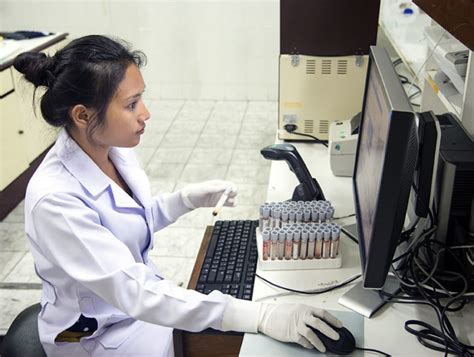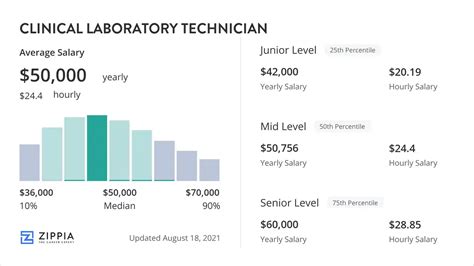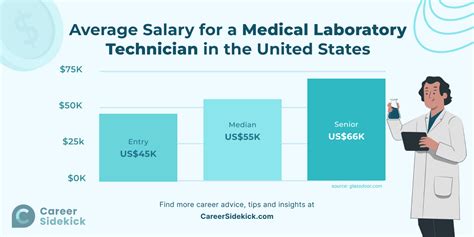For those with a passion for science and a drive to be at the heart of patient care, a career as a Clinical Lab Technologist (also known as a Medical Laboratory Scientist) is a highly rewarding path. These unsung heroes of healthcare provide the critical data that physicians rely on for accurate diagnoses and effective treatments. But beyond the profound job satisfaction, what is the financial outlook?
This article provides a data-driven look at the salary you can expect as a clinical lab technologist. While the national average provides a strong starting point, your earning potential can range from approximately $55,000 to well over $95,000 a year based on key factors we'll explore below.
What Does a Clinical Lab Technologist Do?

Before we talk numbers, let's clarify the role. Clinical Lab Technologists are highly skilled scientists who perform complex chemical, biological, hematological, immunologic, microscopic, and bacteriological tests. They don't just run samples through a machine; they analyze results, troubleshoot sophisticated laboratory equipment, ensure quality control, and interpret findings that are essential for patient health. From identifying cancer cells to cross-matching blood for a transfusion, their work is a vital component of the diagnostic process.
Average Clinical Lab Technologist Salary

Let's get straight to the data. The most authoritative source for employment data in the United States is the Bureau of Labor Statistics (BLS).
According to the U.S. Bureau of Labor Statistics (BLS) Occupational Outlook Handbook, the median annual wage for clinical laboratory technologists and technicians was $60,780 in May 2023. This means half of the professionals in this field earned more than this amount, and half earned less.
The BLS also provides a wider salary spectrum:
- Lowest 10%: Earned less than $38,530
- Median (50%): $60,780
- Highest 10%: Earned more than $92,020
It's important to note that the BLS data combines "technologists" (who typically hold a bachelor's degree) and "technicians" (who may hold an associate's degree). Reputable salary aggregators, which often have data sets more specific to the technologist role, report slightly higher averages. For instance, Salary.com places the median salary for a Medical Technologist around $78,901 as of late 2023, with a typical range between $72,698 and $86,303.
This data illustrates a key point: while the official median is a reliable benchmark, your personal earnings will be shaped by several specific variables.
Key Factors That Influence Salary

The national average is just a number. Your actual salary is determined by a combination of your qualifications, choices, and environment. Here are the most significant factors.
### Level of Education
Education is the foundation of your career and salary. In the lab sciences, the distinction between a technician and a technologist is primarily educational and directly impacts pay.
- Associate's Degree (MLT): An associate's degree typically qualifies you to be a Medical Laboratory Technician (MLT). While essential, this role has a lower salary ceiling than a technologist.
- Bachelor's Degree (MLS/CLT): This is the standard educational requirement for a Clinical Lab Technologist/Medical Laboratory Scientist (MLS). This degree unlocks higher-complexity testing, greater responsibility, and significantly higher earning potential. Professional certification, such as the ASCP Board of Certification (BOC), is often required and is the industry gold standard.
- Master's Degree: An M.S. in Clinical Laboratory Science, Molecular Biology, or a related field can pave the way for specialist, management, or research roles. Lab managers, department heads, and education coordinators typically earn a premium salary reflecting their advanced responsibilities.
### Years of Experience
Experience is one of the most powerful drivers of salary growth. As you gain expertise and prove your value, your compensation will rise accordingly.
- Entry-Level (0-3 years): New graduates can expect to earn on the lower end of the salary spectrum, typically in the $55,000 to $65,000 range, depending on location and employer.
- Mid-Career (4-9 years): With several years of experience, technologists gain speed, efficiency, and the ability to handle more complex cases. Salaries often move firmly into the $65,000 to $78,000 range.
- Senior-Level (10+ years): Highly experienced technologists, especially those who take on lead technologist or specialist roles, can command salaries of $80,000 and above. According to Payscale, late-career professionals can see earnings climb toward the $90,000 mark or higher.
### Geographic Location
Where you work matters—a lot. Salaries for clinical lab technologists vary significantly by state and even by metropolitan area due to differences in cost of living and demand for skilled professionals.
Based on BLS data from May 2023, the top-paying states for this profession are:
1. California: $85,020 (annual mean wage)
2. New York: $83,760
3. Alaska: $80,480
4. Connecticut: $79,840
5. Massachusetts: $79,660
Working in a major metropolitan area within these or other states will generally yield a higher salary than working in a rural location.
### Company Type
The type of facility you work in is another major factor. Different environments have different budget structures and compensation philosophies. The BLS provides a breakdown of median annual wages by top industries:
- General Medical and Surgical Hospitals: $63,010
- Medical and Diagnostic Laboratories: $59,710
- Offices of Physicians: $52,110
- Colleges, Universities, and Professional Schools: $57,000
While hospitals are the largest employers, specialized private labs, particularly those focused on profitable areas like genetics or toxicology, may offer highly competitive salaries to attract top talent.
### Area of Specialization
Generalist technologists are always in demand, but developing a niche specialty can significantly boost your value and pay. High-demand, complex specializations often command a salary premium.
- Blood Banking (Immunohematology): A critical, high-stakes field.
- Microbiology: Identifying bacteria, fungi, and parasites.
- Clinical Chemistry: Analyzing body fluid chemistry for disease markers.
- Hematology: The study of blood and blood disorders.
- Molecular Diagnostics: A rapidly growing field involving DNA/RNA analysis for genetic diseases, infectious diseases, and oncology. Technologists with these advanced skills are highly sought after.
- Cytotechnology: The microscopic study of cells to detect cancer and other abnormalities. This is a highly specialized field that often has its own certification and higher pay scale.
Job Outlook

The future for clinical lab technologists is bright. The BLS projects that employment for this profession will grow by 5% from 2022 to 2032, which is faster than the average for all occupations.
This growth is fueled by several factors, including:
- An aging population, which will lead to a greater need for diagnosing medical conditions.
- The rise of prenatal testing for genetic abnormalities.
- The continuous development of new medical tests and technologies.
The BLS estimates there will be about 24,100 job openings for clinical laboratory technologists and technicians each year over the next decade, many resulting from the need to replace workers who retire or transfer to different occupations.
Conclusion

A career as a Clinical Lab Technologist offers a powerful combination of purpose, stability, and strong financial potential. While the national median salary provides a solid baseline of around $60,000-$79,000, your earning power is firmly within your control.
Key Takeaways:
- Start with a Bachelor's Degree: It's the gateway to the "technologist" title and higher pay.
- Gain Experience: Your salary will grow steadily as you build your skills and expertise.
- Be Strategic About Location: Working in a high-demand, high-cost-of-living state can significantly increase your income.
- Consider Specializing: Developing expertise in a high-demand area like molecular diagnostics can make you an invaluable asset.
For those with a scientific mind and a desire to make a tangible impact on patient health, a career as a Clinical Lab Technologist is not only a fulfilling calling but also offers a clear and promising path to financial security and professional growth.
